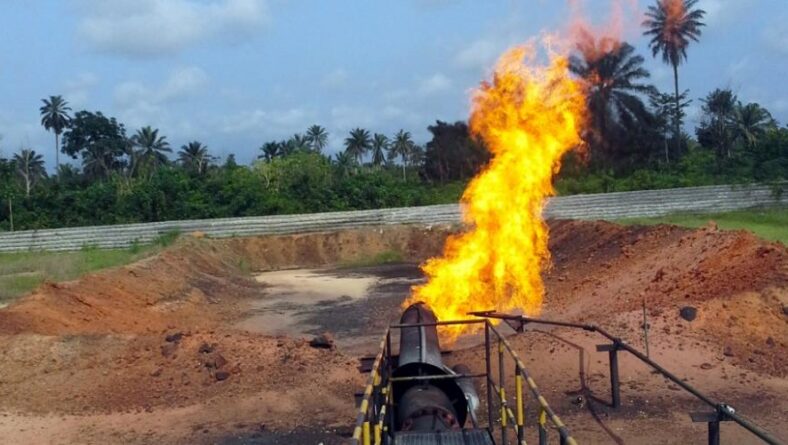Oil remains a curse for the people in the Niger Delta
Before big oil moved into the Niger Delta region, it was the food basket of Nigeria, where the fishing and farming Indigenous people, like the Ogonis of Ogoniland in Rivers State, thrived. When companies like Royal Dutch Shell arrived in 1958, all was lost.
“They promised us that oil production was better than farming or fishing. They said they would develop the region — build roads, hospitals, and schools. It wasn’t long after they began operations that we discovered that the only roads they built were dirt tracks to take their trucks to the oil sites,” said Celestine Akpobari, the National Coordinator of the Ogoni Solidarity Forum in Nigeria.
Gas was now being flared in close proximity to human habitation, devastating the people’s traditional livelihoods. It earned the Niger Delta, now Africa’s largest oil-producing region, its infamous status — one of the most polluted regions in the world.
From 1976 to 1991, almost 3 thousand oil spills occurred in the Rivers State district, spilling a total of 2.1 million barrels of oil, accounting for 40 percent of Royal Dutch Shell’s worldwide oil spill incidents. $30 billion worth of oil was extracted from Ogoni.
The central government profited from this extraction, but none of that money reached the people. Instead, their waters and lands were destroyed by the oil spillage. They lost their livelihoods and continue to live in abject poverty. The search for oil also caused severe land and food shortages.
“Ogoni is oil-rich but the people are very poor. The activities of the oil company sucked the soil dry. They were emitting so much soot in the process of gas flaring. It all came down as acid rain,” Akpobari said.
“It destroyed the skin. It destroyed the crops on the farmland. It caused fishes to migrate to deeper oceans where the Ogoni people could not go fish.”
In the 1990s, the people began organizing against the Shell and Nigerian government nexus and demanded environmental justice under the banner of the Movement for the Survival of Ogoni People (MOSOP), with artist and writer Ken Saro-Wiwa as their president.
300,000 people rallied against oil extraction, attracting international attention. Eventually, they drafted the Ogoni Bill of Rights.
The group claimed that Shell employed the Nigerian army to quash the protests, a claim that Shell initially denied. People reported unlawful killings, rape, torture, and the burning of villages. However, Shell later admitted to providing rations for patrolling troops, sparking suspicions of its direct involvement.
A report by Amnesty International also revealed that Shell provided the military with material support, including transport, and paid a military commander notorious for human rights abuses.
The Nigerian government’s repression of the Ogoni people reached its climax with the execution of nine Ogoni men, including leader Ken Saro-Wiwa.
In 1993, Shell finally ended operations in Ogoniland after continuous negative publicity.
Oil pollution persists after Shell’s departure
While Shell ended operations in Ogoniland, its pipelines still run through the region. It also didn’t stop work in the rest of the Niger Delta. The company’s activities have caused devastating oil spills in both Ogoni and other parts of the Niger Delta. In the decade between 2011 and 2021, almost 10 thousand incidents of oil spills were recorded in the Niger Delta by the Nigerian Oil Spill monitor. Large swathes of land and water remain covered in oil.
“You won’t want to come to Ogoniland, the situation is so bad,” Akpobari remarked.
The life expectancy is 41 years, 10 years less than the national average. The air people breathe and the water they drink makes citizens sick. The groundwater is polluted with benzene — 900 times above the WHO acceptable level. The state of healthcare, education, and sanitation is abysmal.
“People’s livelihoods continue to be tied with the water and land. Women work in the water, they catch fish in the water. Benzene pollution causes miscarriages, neonatal deaths, infertility, and rashes. Our children have respiratory tract infections. They are always coughing,” said Chief Eric Dooh from the Goi community in Gokana, who won a landmark case against Shell in a Dutch court.

Even so, the government continues to neglect the region.
Communities such as those in Ogale are stranded. Their groundwater is polluted and their emergency clean water system has not functioned for the past five years.
In 2011, the United Nations Environment Programme (UNEP) released a report on the damning impacts of oil pollution in Ogoniland. It prescribed a comprehensive clean-up plan for which the Hydrocarbon Pollution Remediation Project (HYPREP) was established. But the process has been painfully slow.
Even today, the spillage continues. Last August, four oil spills from faulty Shell facilities soaked the homes and farmlands of the Bodo community. People had to flee.
Many communities in the Niger Delta region have taken legal action against Shell and some have even won against the oil giant. But Shell continues to deflect blame. Last week, nearly 14,000 Ogale and Bille community people brought individual claims against Shell at the High Court in London.`
It’s worth noting that the Nigerian government is trying to restart oil operations in Ogoniland. The community is not completely opposed to the move, as long as the planning is inclusive of their needs and involves practical community development.
“The people want to see some benefit from oil exploration. It cannot mean we continue living in abject poverty. The cost of everything, including fuel and kerosene is so high, we simply cannot afford it,” said Dooh.
Meanwhile, Shell just reported its highest profits in 115 years.



No Comment